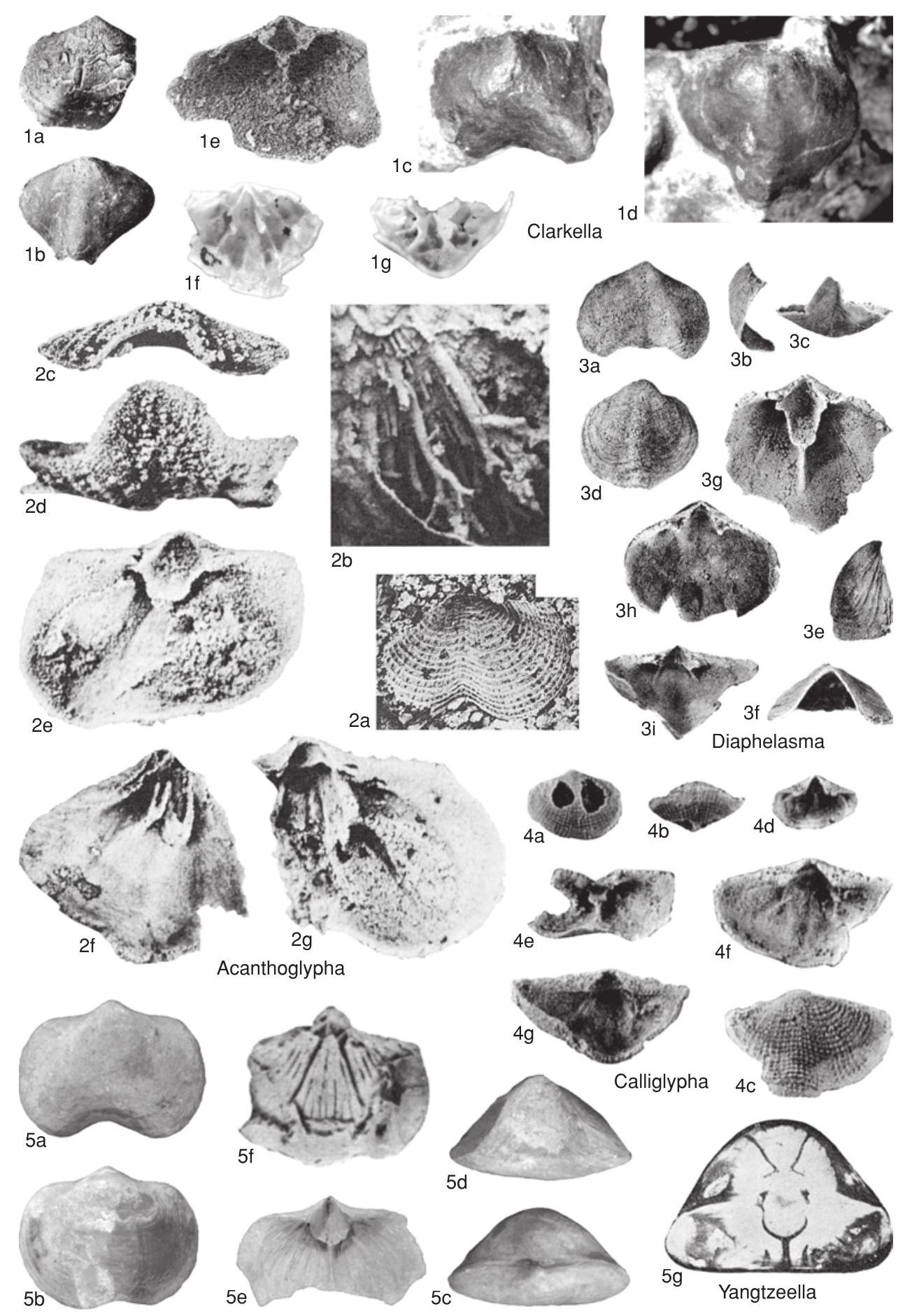Welcome to the Treatise on Invertebrate Paleontology!
Please enter a genera name to retrieve more information.

Porambonites
Classification
Phylum:
Brachiopoda
Subphylum:
Rhynchonelliformea
Class:
Rhynchonellata
Order:
Pentamerida
Suborder:
Syntrophiidina
Superfamily:
Porambonitoidea
Family:
Porambonitidae
Formal Genus Name and Reference:
Porambonites PANDER, 1830, p. 95
Type Species:
P. intermedia, SD Hall & CLARKE, 1893, p. 225
Images
(Click to enlarge in a new window)
Fig. 635, 1a–e. P. (P.) planus PANDER, Arenig, Glauconite limestone, Estonia; a, ventral valve exterior; b, articulated valves, lateral view, ventral valve on right; c, dorsal valve exterior; d, posterior view, ventral valve above; e, anterior view, ventral valve above, USNM 81599, × 1 (new).——Fig. 635, 1f–g. P. (P.) intercedens PANDER, Upper Ordovician, Hohenholm, Estonia; f, dorsal valve exterior; g, posterior view, ventral valve above, beaks ground off showing dental and socket plates, USNM 26897, × 1 (new).——Fig . 635, 1h–i. P. (P.) schmidti N OETLING , lower Llanvirn, Estonia; h, ventral valve interior; i, dorsal valve interior, ×1 (Schuchert & Cooper, 1932).
Synonyms
Geographic Distribution
Canada, Argentina, Russia, Europe, Himalayas, India, China, Australia, South Africa
Age Range
Beginning Stage in Treatise Usage:
Lower Ordovician (Arenig)
Beginning International Stage:
Floian
Fraction Up In Beginning Stage:
0
Beginning Date:
477.08
Ending Stage in Treatise Usage:
lower Silurian (Wenlock)
Ending International Stage:
Homerian
Fraction Up In Ending Stage:
100
Ending Date:
426.74
Description
Biconvexity very strong, uniplication commences on the anterior half, dental plates commonly remain parallel for most of their considerable length, converging only at their anteriormost ends to join with the median ridge, ventral adductor muscle field anterior to and commonly separated from diductors by a very low ridge, very long socket plates and extensions commonly remain subparallel for their entire length, may converge only at their anteriormost ends to join with the median ridge, internal features in both valves commonly thicken and coalesce in older individuals
References
Museum or Author Information
Classification
Phylum:
Brachiopoda
Subphylum:
Rhynchonelliformea
Class:
Rhynchonellata
Order:
Pentamerida
Suborder:
Syntrophiidina
Superfamily:
Porambonitoidea
Family:
Porambonitidae
Formal Genus Name and Reference:
Porambonites PANDER, 1830, p. 95
Type Species:
P. intermedia, SD Hall & CLARKE, 1893, p. 225
Images
(Click to enlarge in a new window)
Fig. 635, 1a–e. P. (P.) planus PANDER, Arenig, Glauconite limestone, Estonia; a, ventral valve exterior; b, articulated valves, lateral view, ventral valve on right; c, dorsal valve exterior; d, posterior view, ventral valve above; e, anterior view, ventral valve above, USNM 81599, × 1 (new).——Fig. 635, 1f–g. P. (P.) intercedens PANDER, Upper Ordovician, Hohenholm, Estonia; f, dorsal valve exterior; g, posterior view, ventral valve above, beaks ground off showing dental and socket plates, USNM 26897, × 1 (new).——Fig . 635, 1h–i. P. (P.) schmidti N OETLING , lower Llanvirn, Estonia; h, ventral valve interior; i, dorsal valve interior, ×1 (Schuchert & Cooper, 1932).
Synonyms
Geographic Distribution
Canada, Argentina, Russia, Europe, Himalayas, India, China, Australia, South Africa
Age Range
Beginning Stage in Treatise Usage:
Lower Ordovician (Arenig)
Beginning International Stage:
Floian
Fraction Up In Beginning Stage:
0
Beginning Date:
477.08
Ending Stage in Treatise Usage:
lower Silurian (Wenlock)
Ending International Stage:
Homerian
Fraction Up In Ending Stage:
100
Ending Date:
426.74
Description
Biconvexity very strong, uniplication commences on the anterior half, dental plates commonly remain parallel for most of their considerable length, converging only at their anteriormost ends to join with the median ridge, ventral adductor muscle field anterior to and commonly separated from diductors by a very low ridge, very long socket plates and extensions commonly remain subparallel for their entire length, may converge only at their anteriormost ends to join with the median ridge, internal features in both valves commonly thicken and coalesce in older individuals
